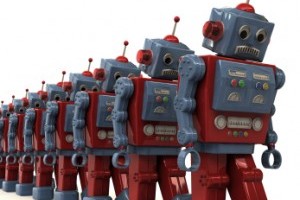
Robohub.org
Jobs isn’t the issue for robotics

Well, not quite. According to Rodney Brooks, robotics has too much Steve Wozniak and not enough Steve Jobs. And perhaps that’s where the jobs part of a very full afternoon forum should have ended. Xconomy’s forum “Robots Remake the Workplace” featured a stellar line up of robotics companies, startups and investors who covered a wide range of views about where robotics industries were going. Vivek Wadhwa, VP of Academics and Innovation at Singularity University and Wade Roush, Xconomy Chief Correspondent and moderator of the sessions, tried hard to represent the recent negative view of robotic’s impact on jobs and the economy. But in the end, it was clear that robots vs. jobs was a far less compelling discussion than diving deeper into what sort of robotics businesses are taking shape and what issues they face.
This post is part of Robohub’s Jobs Focus.
Some of the key points made about robots vs. jobs included the reminder that information technology ie. the computer and spreadsheet, have already ‘taken’ far more jobs than robots will in the next 10 years and that robots vs. jobs was not a debate in other parts of the world, although arguably China will be one of the most affected countries. Curt Carlson, President and CEO of SRI International opened the afternoon by saying that the number of robots is growing faster than the number of people and predicting the emergence of a new smarter manufacturing with ‘zero inventory, zero delay and absolute personalized production’.
Wade Roush framed the debate in US economic terms, will robotics make things worse when the US is in a prolonged period of unemployment? Scholars and media talk about a workplace not ready to change and an education system failing low skilled and low wage workers. Rodney Brooks points to declining number of ‘peak 19yr olds’ in both China and the US and said that factory workers were going to become a scarce resource. Studies that he’s done show that current factory workers do not want their children to follow in their footsteps. Women make up a high percentage of factory workers and that as they age, they’d like less strenuously physical factory work. Brook’s believes that Rethink Robotics is solving these problems with Baxter. Baxter can safely work alongside people and is simple to reprogram. Brook’s keynote address ended with a call to bring tooling back to the US and to improve supply chain dynamism, make quick scale up possible and develop new business models. He believes robotics is on the verge of becoming pervasive and very interesting but there’s still too much Wozniak and not enough Jobs.
“Industrial augmentation not automation” was Aaron Edsinger’s catchphrase talking about turning people into problem-solvers not factory workers. Rich Mahoney wants to see robot business models that democratize our access to quality. Aldo Zini echoes Rodney Brooks – we need tool making facilities back in the US – not just for robots but all manufacturing. Zini also said that robotics was going to be successful when it was solving problems. And a robot that solved a problem was not replacing a human and wouldn’t be seen as ‘evil’. Whether it’s stroke therapy, logistics, factory work or agriculture, that robots were going to be introduced in jobs that were dangerous and difficult or that people were unable to do at all.
The next panel suggested that telepresence robots will make it easier to fill jobs but out of the 3 companies, Double Robotics, Revolve Robotics and Romotive, 2 have made their marketplace ‘family presence’ rather than making a workplace play. Wade Roush offered a discount on Xconomy tickets next year if you attend via telepresence. One interesting point made was that in mobile technology everything is ‘design driven’ innovation whereas in robotics most things are still ‘technology driven’.
Chris Anderson provided a lively keynote for the second half of the afternoon, opining that “robots are the peace divident of the smart phone wars.” The smartphone revolution is “the Cambrian explosion of Robotics…If we hit a hard problem, just wait 6 months.” Chris Anderson was the Editor-In-Chief at Wired but is now CEO of 3D robotics, a company that is about to be larger than Wired. “5 yrs ago I was playing Lego with my kids – today it’s a multimillion $ robot business. It’s never been easier to start a hardware company than now.”
John Kawola, CEO of Harvest Automation was previously involved in 3D printing companies and thinks that robotics is where 3D printing was 15 years ago. Large, expensive, difficult to operate but ready to change gears. Colin Angle CEO of iRobot gave his presentation with Yulun Wang via inTouch robot. I think we’re all dreaming of a future where the most annoying part of robot operation is typing in your itunes password all the time! The event closed with a fascinating discussion between Ajay Agarwal, Bain Capital Ventures, and Steve Jurvetson, of Draper Fisher Jurvetson, about what excited them in robotics.
Both speakers agreed that getting investors interested in robotics was still difficult but projects that were framed in terms of unlocking revenue or creating data were more interesting. And that generally they love automation and less labor intensive companies. Agarwal says that unlocking new capabilities is the path to success and Jurvetson had big dreams about a future in which everything will cost about the same to make and that no one will do repetitive manufacturing. The future will be services, not ‘work’ and will democratize jobs globally. And while Jurvetson has high hopes for disruptive and large initiatives, the next step for robotics is really putting the smart phone everywhere – in toys, in space etc.
For a full list of speakers and perhaps some videos – go to Xconomy.
See all the posts in Robohub’s Jobs Focus →
tags: events, RobohubFocus on Jobs





